Medical expert of the article
New publications
PCR diagnostics in gynecology
Last reviewed: 07.07.2025

All iLive content is medically reviewed or fact checked to ensure as much factual accuracy as possible.
We have strict sourcing guidelines and only link to reputable media sites, academic research institutions and, whenever possible, medically peer reviewed studies. Note that the numbers in parentheses ([1], [2], etc.) are clickable links to these studies.
If you feel that any of our content is inaccurate, out-of-date, or otherwise questionable, please select it and press Ctrl + Enter.

The polymerase chain reaction (PCR) method now makes it possible to identify various infectious agents located in the inflammation focus. The most modern of the molecular methods of DNA hybridization allows identifying the human papilloma virus by serotypes. Molecular studies now make it possible to determine so-called tumor markers in blood serum - abnormal antigens of cells affected by malignant changes. With their help, cancer is recognized at the earliest stages (using the antigen-antibody reaction), when treatment is most effective.
Types of tumor markers used in gynecological practice
Tumor markers |
Detectable diseases |
| Carcinoembryonic antigen (CEA) | Monitoring of rectal, stomach, breast and bronchial cancer |
| alpha-fetoprotein | Pregnancy monitoring, diagnosis and monitoring of primary hepatocellular carcinoma and embryonic cell tumors |
| CA 15-3 | Monitoring of breast cancer therapy (used in combination with CEA) |
| CA 125, CA 19-9 | Monitoring ovarian cancer |
| CA 72-4 | Gastric cancer, mucinous ovarian cancer |
| Human chorionic gonadotropin (beta-HCG) | Non-seminomatous embryonal cell tumors, chorioepithelioma, hydatidiform mole |
| Mucin-like antigen | Breast cancer |

